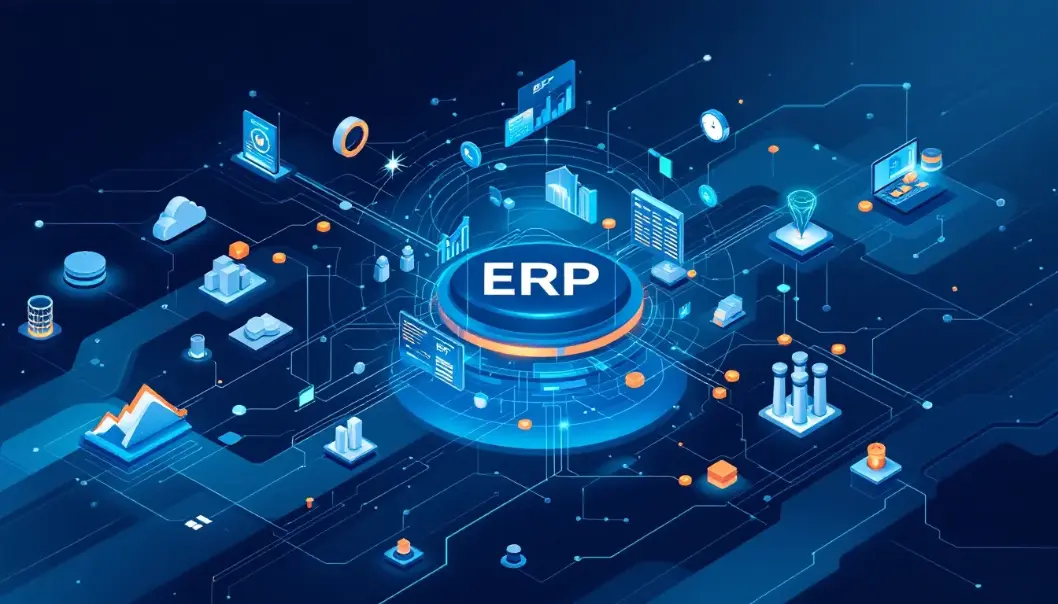What Are ERP Solutions? Your Ultimate Guide to Business Efficiency
Last Updated: October 7, 2025



According to a recent report by Grand View Research, the global ERP software market is projected to reach $123.41 billion by 2030, growing at a CAGR of 11.7%. That’s a staggering number. It also signals one thing: more and more businesses are betting on ERP systems to fuel growth, cut inefficiencies, and keep them competitive.
So, what are ERP solutions really about? ERP, or Enterprise Resource Planning, refers to integrated software systems that consolidate critical business functions into a single, centralized platform.
At Cudio, we’ve seen firsthand how businesses move from feeling stuck in outdated systems to unlocking real agility with more adaptable platforms such as Odoo. We promise that ERP doesn’t have to be overwhelming. It can be your most potent ally in scaling smarter, not harder.
Book Your FREE Consultation Today!
Key Takeaways
- ERP solutions integrate finance, HR, supply chain, and customer management into one unified platform for streamlined efficiency.
- Businesses can choose from on-premises, cloud-based, or hybrid ERP deployments depending on their needs and resources.
- The ERP market is booming, driven by trends such as SaaS adoption, AI-powered insights, and tailored industry-specific solutions.
- With the right ERP partner, transitioning from rigid systems to flexible platforms like Odoo can unlock sustainable growth and resilience.
What is an ERP system?

Running a growing business often feels like spinning plates. Finance, HR, operations, supply chain, and sales are each moving at a different speed and threatening to crash at any moment.
As companies expand, these plates only multiply, and keeping everything balanced without the right systems in place becomes nearly impossible. That’s precisely where enterprise resource planning systems step in.
Instead of relying on disconnected spreadsheets, rigid legacy software, and fragmented tools, ERP provides a single, streamlined platform. It unifies your company’s most essential functions under one roof. Finance, operations, supply chain, HR, and sales all feed into a shared database and workflow engine.
When everything is connected, teams stop working in silos and begin operating with greater visibility, stronger communication, and smarter, faster decision-making. They have access to shared documents, no longer relying on clunky email threads that are hard to manage, impossible to track, and difficult to automate. It’s the difference between stumbling through growth and strategically steering your company toward new opportunities.
Key Components of ERP Systems

When you peel back the layers of an ERP system, you’ll find that its real strength lies in the way it’s built. That is, modular applications that plug into one another, all connected by a shared database.
Let’s break down the core components that make ERP systems so impactful for growing businesses.
Financial Management
For most business owners, finance is the beating heart of operations, and ERP systems make sure it doesn’t skip a beat. With a financial management module, you can:
- Track accounts payable and receivable seamlessly.
- Generate detailed financial reports in minutes.
- Automate expense tracking and manage budgets more effectively.
- Forecast with real-time data so you can adjust plans on the fly.
Banks, shareholders, and leadership teams alike rely on ERP-driven data for its accuracy and reliability. We’ve also worked with companies that used to spend weeks closing their books each quarter. However, after implementing Odoo ERP, they reduced that process to just a few days.
Accurate, dynamic financial data doesn’t just save time. It prevents costly mistakes, such as compliance fines or missed revenue opportunities.
Book Your FREE Assessment Today!
Human Resources Management
Managing people is just as complex as managing numbers, and ERP helps simplify both. The HR module goes beyond payroll and employee records. It can handle:
- Recruitment and onboarding.
- Payroll and benefits management.
- Performance tracking and compliance with labor laws.
Centralizing employee data reduces risk and helps HR teams support workforce growth with less manual effort.
Supply Chain & Procurement
If finance is the heart, the supply chain is the backbone of any business. ERP’s supply chain management and inventory management component enables companies to:
- Track material flows and stock levels in real time.
- Automate procurement processes and vendor management.
- Pinpoint top-performing (and underperforming) products.
- Optimize logistics and ensure smooth product delivery.
One of our clients in distribution transitioned from manually tracking shipments in spreadsheets to automating their entire supply chain using Odoo. The result? Faster deliveries, fewer errors, and a procurement process that practically runs itself.
Customer Relationship Management (CRM)
No matter how efficient your back office is, success hinges on how well you serve your customers. ERP systems with CRM automation connect the dots between operations and customer engagement by:
- Organizing client and prospect data in one place.
- Managing sales pipelines and automating follow-ups.
- Giving teams a 360° view of customer interactions.
The sales department benefits from real-time visibility into orders, while customer service teams can resolve issues faster. Ultimately, CRM within ERP translates directly into stronger relationships and happier clients.
Choosing the Right ERP Deployment Model

Not all ERP systems are created equal, and the deployment model you choose can significantly impact efficiency, cost, and flexibility. Each option comes with its own strengths, challenges, and features.
On-Premises ERP: Full Control, Full Responsibility
On-premises ERP is a traditional deployment method where the software is installed and runs on servers within your own data center. This model provides your business with complete control over hardware, software, and security, making it ideal for organizations with stringent compliance requirements or highly customized processes.
- Hosted locally on company servers for complete control.
- Customization: Tailor modules to specific business needs.
- Security: Full oversight of sensitive data.
- Requires in-house IT staff for maintenance and updates.
- Higher upfront costs for hardware and software.
- Integration complexity with existing IT infrastructure.
Cloud-Based ERP Solutions: Flexible, Scalable, Accessible
Cloud ERP software sis no longer a niche option; it has become the preferred choice for many businesses, ranging from small to mid-sized companies. Cloud-based ERP systems run on remote servers and are accessed via the internet. Odoo Online is a great example of this model. SaaS deployments simplify installation, reduce upfront costs, and allow organizations to scale quickly.
- Hosted remotely via SaaS providers, reducing infrastructure demands.
- Subscription-based pricing eliminates significant capital expenses.
- Fast deployment without on-premise setup.
- Automatic updates and maintenance are handled by a provider.
- Accessible from anywhere, ideal for distributed teams.
- Scalable to adapt quickly to business growth or changes.
Hybrid ERP: Best of Both Worlds
Hybrid ERP systems, such as a combination of Odoo Online and Odoo On-premise, merge the benefits of cloud and on-premise deployments. This approach allows companies to maintain control over sensitive data on-site while leveraging cloud modules for scalability.
- Mix of on-premises and cloud capabilities.
- Flexibility to keep critical systems in-house while using cloud features for others.
- Two-tier approach possible: headquarters on-premises, subsidiaries on cloud.
- Integration challenges can arise for real-time data consistency.
- Gradual transition from legacy systems to modern ERP solutions.
Feature | On-Premises ERP | Cloud-Based ERP | Hybrid ERP |
Hosting | Local servers | Remote servers | Mix of local and remote |
Control | Full control | Limited control | Moderate control |
Upfront Cost | High | Low | Medium |
Maintenance | In-house | Provider | Shared |
Deployment Speed | Slower | Fast | Medium |
Accessibility | Limited | Anywhere | Mixed |
Scalability | Moderate | High | Flexible |
Security Oversight | Full | Provider-managed | Shared |
Evaluating ERP Solutions for Your Business

Choosing the right ERP system requires a structured approach that aligns technology with your business goals. A thoughtful evaluation helps ensure that the system you select delivers a strong ROI, improves efficiency, and scales with your growth.
Assessing Your Business Needs
Before exploring ERP options, it’s crucial to take a step back and assess your organization’s specific needs. Key factors to consider include:
- Operational complexity: How intricate are your workflows, and how many departments need integration?
- Regulatory requirements: Are there compliance standards that the system must support?
- Scalability: Will the ERP grow with your business and adapt to changing demands?
- Budget considerations: Both initial investment and long-term costs need careful evaluation.
Red flags that your business may be ready for ERP include:
- Reliance on Excel or QuickBooks for critical operations
- Inefficiencies
- Repeated manual processes
- Obstacles to scaling.
The choice of deployment also depends on your company's size, IT capabilities, and need for customization. For example, large enterprises in regulated industries often benefit from on-premises ERP solutions due to their high customization needs. At the same time, hybrid ERP can be ideal for multi-location businesses seeking fast deployment through pilot projects.
Calculating ROI and Expected Outcomes
ERP systems are tools that provide business insight and support strategic decision-making. The benefits include:
- Comprehensive company overview: Track performance metrics across finance, operations, supply chain, and sales.
- Data accuracy and transparency: Eliminate silos to ensure that decision-makers operate from a single source of truth.
- Real-time visibility: Instant access to performance data empowers executives to make better strategic choices.
Calculating potential ROI involves assessing how ERP addresses inefficiencies and performing a cost-benefit analysis that compares operational improvements against the total investment of ERP implementation. Modern ERP systems also provides compliance-ready financial reporting, which is critical for understanding the economic impact of the system on your organization.
Key Success Factors and Risk Management
Implementing an ERP is a significant undertaking, and several factors can influence success:
- Active user communities: Leveraging peer support and shared best practices can optimize your ERP’s use.
- Identifying implementation challenges early: Anticipating issues helps streamline deployment and reduce downtime.
- Vendor credibility: Choose an ERP provider who truly understands your business and can implement strategies effectively. Aim for a hands-on operator, not just a career consultant, by verifying references and support capabilities to ensure reliability.
- Business case justification: Demonstrating clear benefits versus costs secures stakeholder buy-in and aligns the organization around the ERP investment.
At Cudio, we emphasize the importance of tailored support services. Our team guides businesses through deployment, training, and ongoing optimization to ensure that ERP systems continue to deliver value long after go-live.
Book Your FREE Consultation Today!
Odoo and Cudio: Crafting ERP Solutions That Fit Your Business
Odoo’s open-source, flexible architecture enables companies to start with essential applications and expand across operations as their needs evolve. At Cudio, we help businesses unlock the full potential of Odoo, turning complex or stalled ERP projects into smooth, high-performing systems.
Why Odoo Stands Out
Odoo is built around modularity, enabling organizations to implement just the apps they need and add more over time. This approach reduces risk, lowers upfront costs, and allows teams to adapt as workflows change. Features include finance, HR, inventory management, sales, CRM, and manufacturing, all interconnected for real-time visibility and operational efficiency.
The true power of Odoo lies in its flexibility:
- Incremental adoption: Odoo is an affordable ERP solution for startups. Start small and scale up with new modules as your business grows.
- Customizability: Tailor workflows, dashboards, and reports to match your exact business needs.
- Open-source ecosystem: Access a wide range of third-party apps and integrations.
- Upgrade-friendly design: Modernize and expand your system without requiring a complete overhaul.
How Cudio Elevates Odoo Implementations
Our team at Cudio specializes in making Odoo work for your business, even when previous projects hit roadblocks. We focus on stabilizing systems, optimizing performance, and ensuring smooth adoption across all departments.
Our services include:
- Odoo migration and implementation: Seamless transitions from legacy systems like SAP, Microsoft Dynamics 365 ERP, QuickBooks, or Excel.
- Customization and development: Tailor apps and workflows to match unique business processes.
- Integration: Connect Odoo with other tools and platforms for a unified ecosystem.
- Upgrades: Keep your system current and compatible with business growth.
- Rescue and repair services: Turn around stalled or problematic Odoo projects.
We understand that implementing an ERP can be challenging. That’s why we at Cudio always believe in providing hands-on guidance, tailored solutions, and continuous support. Our promise is simple: your Odoo ERP system should empower your business, not slow it down.
Book Your FREE Consultation Today!
Case Studies and Real-World Applications
From manufacturing to retail, service companies to healthcare, these systems streamline business operations and provide actionable insights. At Cudio, we’ve partnered with diverse businesses to implement Odoo ERP solutions that transform daily operations and strategic decision-making.
Retail and Wholesale: Simons Shoes
Simons Shoes demonstrates how a modular ERP system, paired with Cudio’s integration expertise, can accelerate retail operations and create a more responsive, agile business model.
Together, we rolled out Odoo modules including inventory, POS, purchasing, and sales. We also integrated the Rithum platform using Cudio's Rithum-Odoo Connector.
And the results reflect this careful implementation. Simons Shoes enjoyed a significant increase in e-commerce revenue. Not to mention, real-time visibility into sales and inventory via Odoo dashboards. Additionally, they gained the ability to launch new products on additional marketplaces within one to two weeks.
Healthcare Industry: Lexington Medical
Lexington Medical’s experience highlights how a flexible, integrated ERP system can support complex operational structures.
Our team at Cudio helped deploy Odoo modules covering inventory, accounting, manufacturing, sales, and CRM. Also, we implemented advanced custom financial reporting and automated intercompany transactions.
The results? We reduced the financial close process by over 50% while cutting error rates. Furthermore, Lexington Medical was able to efficiently manage complex Bills of Materials (BOMs) across global operations.
Conclusion
So, what are ERP solutions? Simply put, they’re robust systems that bring together all the essential parts of your business into one seamless platform. The result? Smoother operations, sharper insights, and better control across every department. This also empowers your team to make smarter decisions and respond quickly to market shifts.
Picking the right ERP doesn’t have to be overwhelming. It starts with a clear understanding of your business needs, a realistic ROI analysis, and a focus on success factors while managing potential risks. With hands-on expertise from our team at Cudio, businesses can turn ERP implementation into a success story
Embrace ERP solutions that work for your business and watch clarity and performance become your new normal.
Book Your FREE Consultation Today!
Frequently Asked Questions
Have questions? We’re happy to help!
What is ERP?
ERP, or Enterprise Resource Planning, is a software system that integrates and automates various core business processes within an organization to enhance efficiency and productivity. It helps streamline operations across different departments by managing resources in a unified platform.
How do ERP systems improve business efficiency?
ERP systems significantly enhance business efficiency by unifying various functions, streamlining communication, and offering real-time insights that facilitate better decision-making. This integration ultimately leads to more effective operations throughout the organization.
What are the main deployment models for ERP systems?
The main deployment models for ERP systems include on-premises, cloud-based (SaaS), and hybrid solutions, each catering to unique business requirements and offering distinct advantages. Understanding these options can help you choose the best fit for your organization.
How does Cudio enhance Odoo ERP implementations?
Cudio enhances Odoo ERP implementations by stabilizing unsuccessful projects and offering seamless upgrades, along with customized preconfigured trials to ensure alignment with business objectives. This targeted approach ensures a more effective and efficient ERP solution for your organization.
What industries benefit from ERP solutions?
Manufacturing, retail, healthcare, and utilities are among the industries that benefit from ERP solutions by enhancing operational efficiency and streamlining processes. Overall, ERP systems enable these sectors to improve productivity and reduce costs.


